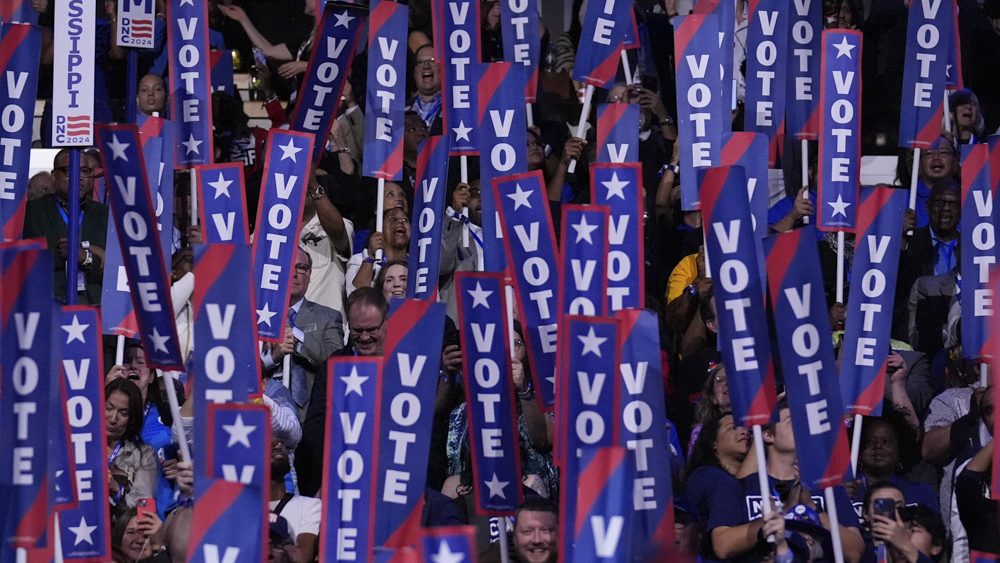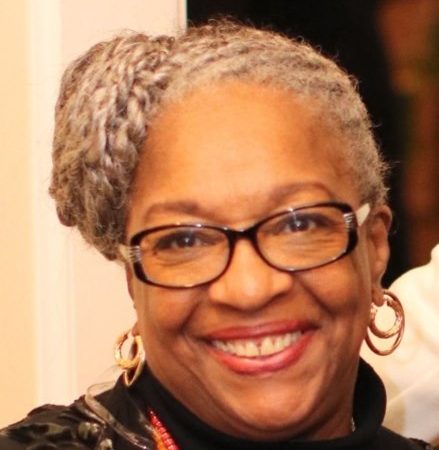Detroiter at DNC who attended more than a dozen conventions encourages younger generations to tune in
Quinn Klinefelter August 21, 2024Tene Ramsey has attended every Democratic convention since the mid-1970s — excluding the televised convention in 2020 during the pandemic.

Delegates hold signs as former President Barack Obama speaks during the Democratic National Convention Tuesday, Aug. 20, 2024, in Chicago.
The Democratic National Convention completely changed its tenor after Vice President Kamala Harris became the party’s official nominee.
But at an event now cast as one celebrating youth and vigor, the voices of experience still have much to offer.
Take Detroiter Tene Ramsey, who has attended every Democratic convention since the mid-1970s — excluding the 2020 version during the pandemic, which was televised.
At the political gathering this week in Chicago, I had a chance to speak with Ramsey, who says she had a very close brush with a president decades before she went to her first convention.

Listen: Detroiter shares why she’s attended almost every Democratic convention since the 1970s
The following interview has been edited for clarity and length.
Tene Ramsey: I was born on May 8, 1949, and President Truman was the president at the time, and he was also born on May 8, but many years before me. Well, somehow he just had to hold this little brown baby girl that had the same birthday on him, and my mother was trying to tell him ‘no, she’s kind of fidgety,’ and I peed on the president. And they said then that they knew I was going to have some type of involvement in politics, and that stands true to the day.
Quinn Klinefelter: How does that show you’re going to have involvement with politics?
TR: Because I am involved in politics. I’m not a political figure, but I always work with different politicians to hopefully help them get elected.
QK: So you said that you’ve been coming to conventions like this for a long time?
TR: Very long. I first started off with Jimmy Carter. I’ve been to every president convention since then — except in 2020, because that was televised — but I watched every minute of it on the TV.
QK: Why? Why have you been coming to so many?
TR: Because I believe in the democratic process, and I never go to anything that I don’t believe that they’re the best candidate for our country, and so I want to be supportive. I want to make sure that the Democratic Party is well represented, it inspires me to motivate other folks to do what’s right.
QK: What do you think about this convention? To you, how does it seem to compare to some of the other ones in the past?
TR: You know what, every convention has its own personality. This is exciting just because it’s a female of color. And that’s really exciting because whoever thought in your wildest dream that the forefathers even thought that a descendant from slavery would one day possibly be the President of the United States, and it’s exciting across the board. Female and a person of color? You know, one drop of Black blood and you’re Black — and a Black woman too? Oh, I am really elated. That’s motivating.
What’s interesting, when Carter ran, he gave out little gold peanuts, and do you know somebody took my peanut? And I cannot find it…I told my kids, do you have my peanut? Every time I get ready to go to the convention, I say, ‘who has my peanut?’ It’s just a keepsake. That’s just a little joke with the family. Somebody took my peanut.
QK: Other than this particular one, and the historical significance of it. I mean, are there some moments from the past conventions that really stand out to you?
TR: Yeah, when President Obama’s family walked out on stage, it gave me a real warm feeling of pride and happiness — that stood out more so than any other convention. So when you say that, I’m just wondering how I’m going to feel on Thursday when our future president Harris walks out.
QK: Obviously, the conventions and the candidates are here to talk about the policy issues, and when you do talk to some of the people back in metro Detroit, they will talk about the economy and inflation and the prices are just so high for everything that they got to buy sometimes, and that that’s what they’re going to be looking at maybe when they go in the voting booth. How have things been going for yourself? I mean, has it been affordable? Or what would you say to people that think the prices are so high?
TR: I have seen an increase on prices, from gas to food, from eggs to you name it. Everything seems like prices are going up, but it’s heartbreaking that all other countries, we can support them and not really support our own as fully as I feel we should. I don’t believe in wars, you know, I wish we could all work it out. I don’t agree with what just happened over the last year, or just killing so many people. What kind of people do that to each other? You know, my ancestors came over on the slave ship. And I watch from generation to generation — like I tell my kids — everybody looks out for their own race, and it’s about time that we united and not put down anybody else. I know quite a few Jewish people, and I know quite a few Arab-descended people, and it hurts to see one nationality crush another, because I know how we feel as African Americans and what has happened to us throughout the centuries.
QK: Whoever would wind up being president, what would you like to see them do about that situation?
TR: It would be good if they could call the nations together and sit down and have a heart to heart talk. I don’t know if it’s possible to have — how we said, “come to Jesus” meeting, whatever nationality or whatever you believe in — but have a heart to heart and say, “how can we resolve this without all this killing going on. Can’t we come to some type of compromise?” I’m not sure how we can remedy this problem, because it’s been going on seems like forever.
QK: Along with that situation, when you talk to people in Detroit — the whole metro area — from what you have seen personally, what would you say to people?
TR: Well, you know, I tried to motivate everybody at home to watch the conventions — especially the younger folks — being my age and being around for seven decades plus, I’m asking all the young folks back home and at my church, which is the Shrine of the Black Madonna, to make sure they watch the convention and understand the importance of voting. And I have to use a quote from our city clerk: “It’s important to vote, but it’s more important to do the right thing and vote.” People died for voting, and now it’s our turn to take it to the next level. We have to vote if we want to see change, and that’s all I can say.
Use the media player above to listen to the interview with Tene Ramsey at the Democratic National Convention in Chicago.
Trusted, accurate, up-to-date.
WDET strives to make our journalism accessible to everyone. As a public media institution, we maintain our journalistic integrity through independent support from readers like you. If you value WDET as your source of news, music and conversation, please make a gift today.
